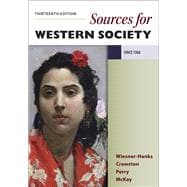Sources for Western Society provides a variety of primary sources to accompany A History of Western Society, Thirteenth Edition. With over thirty new selections – including several compelling visual sources – and enhanced pedagogy throughout, students are given the tools to engage critically with canonical and lesser known sources. Each chapter includes a Sources in Conversation feature that asks students to analyze aspects of differing views on key topics.
Sources for Western Society is included with the LaunchPad for A History of Western Society. In LaunchPad for A History of Western Society, 13e, which combines ebooks for A History of Western Society and Sources for Western Society in a central course space, innovative auto-graded exercises accompanying the reader’s documents and visuals supply a distinctive and sophisticated pedagogy that not only helps students understand the sources but think critically about them. Sources for Western Society is also available to customize through Bedford Select.








